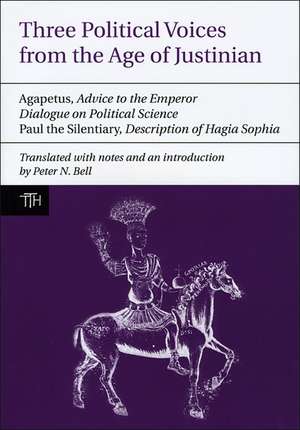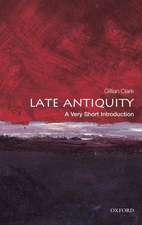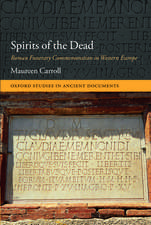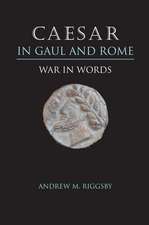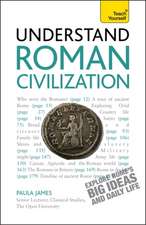Three Political Voices from the Age of Justinian – Agapetus – Advice to the Emperor, Dialogue on Political Science, Paul the Silentiary – Descripti
Autor Peter Bellen Limba Engleză Paperback – 4 oct 2009
This one-volume translation, with commentary and introduction, brings together three important works—Advice to the Emperor, Dialogue on Political Science, and Description of the Hagia Sophia—which cast light on the generally neglected politics and ideology of early Byzantium. No complete modern English translation of any of these three works exists and they each highlight the clash of political and religious ideology of the period.
Preț: 389.52 lei
Nou
Puncte Express: 584
Preț estimativ în valută:
74.54€ • 79.70$ • 62.15£
74.54€ • 79.70$ • 62.15£
Carte tipărită la comandă
Livrare economică 17 aprilie-01 mai
Preluare comenzi: 021 569.72.76
Specificații
ISBN-13: 9781846312090
ISBN-10: 1846312094
Pagini: 256
Dimensiuni: 166 x 212 x 14 mm
Greutate: 0.36 kg
Ediția:New.
Editura: Liverpool University Press
ISBN-10: 1846312094
Pagini: 256
Dimensiuni: 166 x 212 x 14 mm
Greutate: 0.36 kg
Ediția:New.
Editura: Liverpool University Press
Notă biografică
Peter N. Bell teaches at the University of Oxford.
Cuprins
Preface
Abbreviations
INTRODUCTION
1. The World of Agapetus, the Dialogue on Political Science and Paul the Silentiary
2. The Authors
3. Dating
4. Agapetus—Advice: His Sources, Methods and Thought
5. The Dialogue on Political Science—Sources, Methods and Thought
6. Paul the Silentiary—Description of Hagia Sophia: Sources, Methods and Thought
7. Texts and Translations
AGAPETUS: ADVICE TO THE EMPEROR JUSTINIAN
Translation and Notes
THE DIALOGUE ON POLITICAL SCIENCE
BOOK 4—MILITARY MATTERS
Translation and Notes
BOOK 5—THE IDEAL STATE
1. Translator’s Synopsis
2. Translation and Notes
PAUL THE SILENTIARY: DESCRIPTION OF HAGIA SOPHIA
Translation and Notes
Selected Bibliography
Map of Constantinople
Index
Abbreviations
INTRODUCTION
1. The World of Agapetus, the Dialogue on Political Science and Paul the Silentiary
2. The Authors
3. Dating
4. Agapetus—Advice: His Sources, Methods and Thought
5. The Dialogue on Political Science—Sources, Methods and Thought
6. Paul the Silentiary—Description of Hagia Sophia: Sources, Methods and Thought
7. Texts and Translations
AGAPETUS: ADVICE TO THE EMPEROR JUSTINIAN
Translation and Notes
THE DIALOGUE ON POLITICAL SCIENCE
BOOK 4—MILITARY MATTERS
Translation and Notes
BOOK 5—THE IDEAL STATE
1. Translator’s Synopsis
2. Translation and Notes
PAUL THE SILENTIARY: DESCRIPTION OF HAGIA SOPHIA
Translation and Notes
Selected Bibliography
Map of Constantinople
Index
Recenzii
“Seldom have I seen the promise of ‘accessible to the beginner, useful to the expert’ better fulfilled. The reader without any background in sixth-century history or Platonic philosophy will not be at a loss and the reader well-versed in either will see sources neatly traced and patterns astutely identified.”
